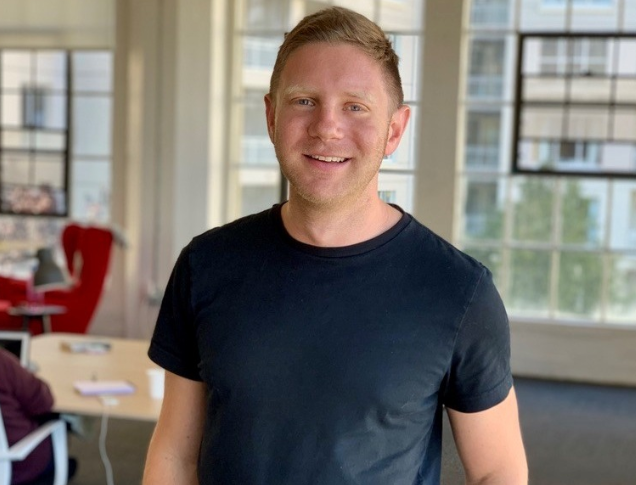Adam Nathan went from working in the White House to launching a tech startup that has raised sizable seed and Series A funding rounds.
During his appearance on the Dealmakers Show, Nathan talked about whether or not you should become an entrepreneur, skiing, and competitiveness, managing your fundraising process for oversubscribed rounds, productivity, and solving big problems.
Listen to the full podcast episode and review the transcript here.

*FREE DOWNLOAD*
The Ultimate Guide To Pitch Decks
Taking The Leap Into Entrepreneurship
Adam Nathan was born and raised in NYC. A city he loves for its diverse culture and endless stimulation.
His parents were entrepreneurs that ran their own small business together. They taught Adam and his brother the values of persistence and hard work. How to really put your all into something, as well as the responsibility of giving back and improving the world.
Adam recalls watching his mother stay up late doing the accounting for the company, while they ate candy and watched TV. From a young age, he was inspired by the self-sufficiency entrepreneurship could provide, and how it enabled you to control your own destiny.
Although he took the scenic route to becoming an entrepreneur, by first going to work for other companies, he credits those work experiences with helping him find his way to what he is doing now.
Still, some of his top advice for others considering starting their own businesses today is to put off the fear, knowing that no matter what you do it is going to be hard, and just jump in sooner anyway.
Raise Capital Smarter, Not Harder
Entrepreneurship vs. Middle Management – The Challenges
With that said, Nathan doesn’t believe that entrepreneurship is for everybody. Despite how it is portrayed as being sexy, glamorous, and full of riches, he says that it is extreme exercise and persistence, and grit. There is a lot of difficulty, self-doubt, and pain involved.
Of course, being stuck in middle management, and dealing with all of the corporate politics and inefficiencies there can be hell too. In a startup, it is finding product market fit, scaling, team building, and fundraising. It’s all about what type of pain you want to deal with every day.
Adam says that he feels he was definitely built to be a founder. He believes waiting any longer to take the leap would have certainly limited the potential of his career.
Yet, he says it is only something you should do if there is nothing else you can do. Or if you have a nagging idea that keeps you awake at night, every night.
Skiing & Competition
Adam Nathan’s father was a big skier. Growing up, they spent many winters skiing together. Adam specifically took to racing on skis.
It’s an individual, highly competitive sport. One that requires moving very fast, and balancing a lot of risk with precision. One which clearly carries a lot of similarities to founding a startup.
Though after competing on the junior national ski team, he left the sport behind for college. Today, he gets on the slopes for fun with friends, and fulfills his competitive nature in his business, working as a team instead.
Experiences which he says come with a lot more purpose, than just trying to get empty awards for doing things that please other people.
Internships: From The White House To Apple, And Lyft
During his senior year studying at Duke, Nathan received a call from an anonymous phone number. It was the White House, asking him to come and intern there.
It was early in Obama’s time in office when he was working on Obamacare and the Dodd-Frank Act.
At just 21 years old, and never having had a full-time job before, he was thrust into doing a lot of work on these projects. Managing people, scheduling meetings, and engaging with bank CEOs and advisors to the president.
There he says he learned that you can have a big impact and that working hard does make a difference.
Next, he did some consulting, got his MBA at Harvard, worked for a couple of other companies, and also did internships with Apple and Lyft.
Adam told the Dealmakers Show audience that he was always interested in complex system design, and ways to change the world.
After seeing the inefficiencies in big corporations like airlines, as well as in nonprofits, and federal government agencies, he saw technology as the tool to make that happen.
Finally, in early 2019 he and a cofounder saw instant traction with one of their ideas and decided to quit their jobs and jump into their own startup, Almanac.
Productivity & Solving Big Problems
Today, Almanac has really evolved into a productivity tool, enabling faster work, and speedier decisions, in the new world of remote work. Without all of the cringeworthy, inefficient meetings.
He sees this as a way to empower people to spend time on real work and work they thrive doing. While accelerating the ability to solve the world’s biggest and most pressing problems.
On the journey, they’ve already raised a $9M seed round and $40M Series A.
Storytelling is everything which is something that Adam Nathan was able to master. Being able to capture the essence of what you are doing in 15 to 20 slides is the key. For a winning deck, take a look at the pitch deck template created by Silicon Valley legend, Peter Thiel (see it here), where the most critical slides are highlighted.
Remember to unlock the pitch deck template that is being used by founders around the world to raise millions below.
Listen in to the full podcast episode to find out more, including:
- Managing your fundraising process
- Oversubscribed funding rounds
- Productivity
- How Almanac is making a difference

SUBSCRIBE ON:





Facebook Comments